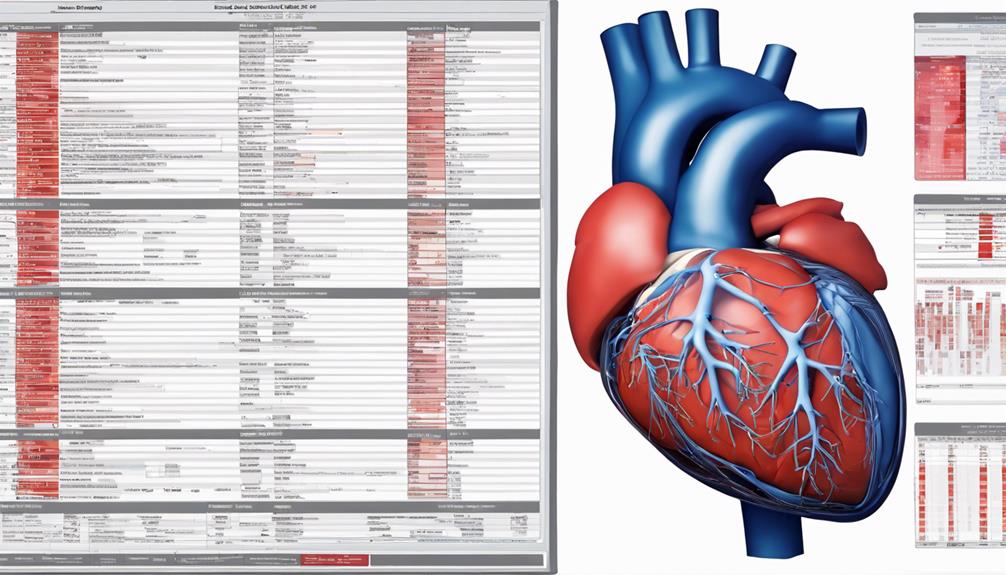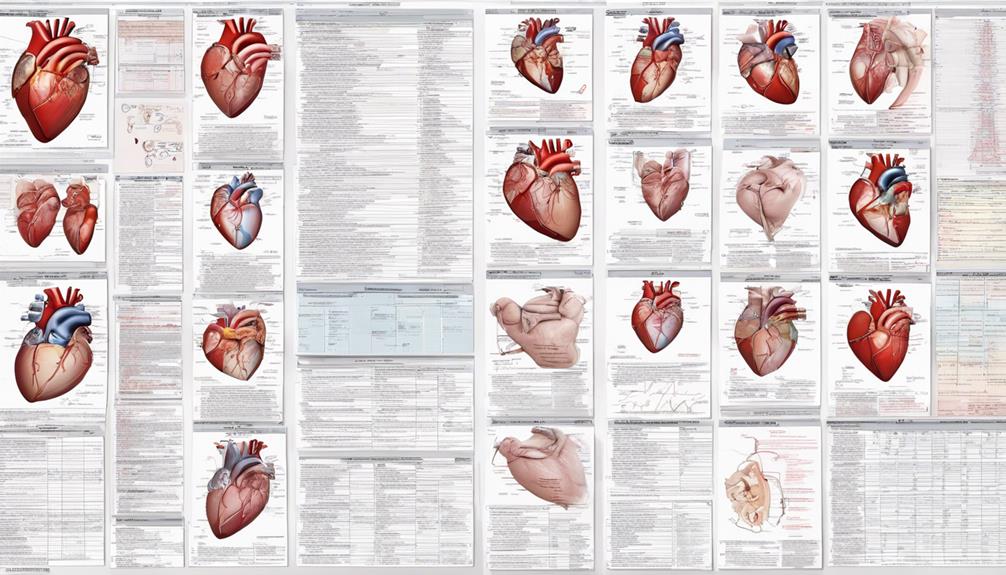It might come as a surprise to some, but accurately identifying the appropriate ICD-10 code for congenital heart disease is vital in the medical records field. Knowing the details of coding for this specific condition is key to improving patient care results and the efficiency of healthcare systems.
With the complexity of heart abnormalities, properly documenting and coding congenital heart diseases is paramount.
Let's explore the nuances of this specific ICD-10 code, its implications, and how it influences various aspects of the medical field.
Key Takeaways
- Accurate coding crucial for tracking, billing, and analyzing outcomes.
- Proper documentation specifies disease type, severity, complications, and treatment plans.
- Understanding specific ICD-10 codes essential for accurate billing.
- Detailed documentation supports research, patient care, and healthcare system efficiency.
Overview of Congenital Heart Disease
Exploring the intricacies of congenital heart disease reveals a complex array of structural abnormalities present in the heart from birth. Congenital heart disease encompasses a broad spectrum of conditions affecting the heart's structure and function. These abnormalities can involve defects in the walls of the heart, the valves that regulate blood flow, or the blood vessels that carry blood to and from the heart. Such defects can disrupt the normal flow of blood through the heart and the rest of the body, leading to a range of symptoms that can vary in severity.
While some individuals may experience mild symptoms or even be asymptomatic, others may face more severe complications affecting their heart function and overall health.
Early diagnosis and appropriate management are crucial in addressing congenital heart disease. Treatment modalities may include medications to alleviate symptoms, interventional procedures to repair defects, or surgical interventions to correct structural abnormalities. Continuous follow-up care is essential to monitor the condition and ensure optimal management throughout the individual's life.
Importance of Accurate Coding

Upon examining the complexities of congenital heart disease, accurate coding plays a pivotal role in ensuring proper documentation for treatment and billing purposes. Coding accurately for conditions such as congenital malformation of the heart is crucial for healthcare providers to receive appropriate reimbursement for the services provided. Moreover, precise coding enables tracking and analysis of the prevalence and outcomes of congenital heart disease on a larger scale, aiding in public health efforts and resource allocation. Additionally, accurate coding supports research endeavors aimed at enhancing the understanding of the epidemiology and management of congenital heart disease, ultimately leading to improved patient care outcomes.
Conversely, coding errors can have significant consequences, including claim denials, treatment delays, and potential financial repercussions for both healthcare providers and patients. Therefore, ensuring meticulous attention to detail in coding for congenital heart disease is paramount to avoid these pitfalls and to promote efficient healthcare delivery and accurate data analysis.
ICD-10 Code Classification
The accurate classification of congenital heart disease using ICD-10 codes is essential for precise documentation and tracking in medical records. Within the ICD-10-CM coding system, congenital heart disease is categorized under Q20-Q28, encompassing a range of codes for congenital malformations of the circulatory system. These codes specifically address various types of heart defects, allowing healthcare providers to accurately identify and record the specific condition affecting a patient.
Proper utilization of these codes ensures that congenital heart disease cases are appropriately classified, facilitating comprehensive monitoring and analysis of such conditions within healthcare settings. The ICD-10-CM guidelines offer detailed instructions on how to assign the correct code for each distinct type of congenital heart disease, aiding healthcare professionals in documenting and billing for treatments and services related to these conditions.
Understanding the classification system is paramount for healthcare providers to effectively manage and provide care for individuals with congenital malformations of the heart.
Documentation Guidelines

Reviewing the documentation guidelines for congenital heart disease is crucial for accurate coding and comprehensive patient care. It's imperative to specify the type and severity of the congenital heart disease in the documentation to ensure precise coding. Additionally, including any associated anomalies or complications is essential to capture the complete clinical picture.
When documenting procedures related to congenital heart disease, be sure to provide detailed descriptions to support appropriate code assignment. Specifically, documenting the patient's history of congenital heart disease, including any previous surgeries or interventions, is critical for accurate coding and billing.
In cases involving congenital heart disease affecting the left ventricular, detailed descriptions of symptoms, diagnostic tests, and treatment plans are particularly important. This information not only aids in precise coding but also contributes to comprehensive patient care by ensuring that all aspects of the condition are properly addressed.
Billing Considerations
To ensure accurate billing and reimbursement for congenital heart disease, understanding the specific ICD-10 code, such as Q24.9 for congenital malformation of the heart, is crucial. Proper documentation and coding play a significant role in the billing process. Billing considerations for heart disease may involve the use of modifiers to provide additional information related to the diagnosis. Following coding guidelines and documentation requirements is essential to demonstrate the medical necessity of services provided for congenital heart disease. Coordination with payers is also important to ensure proper claims submission and timely reimbursement. Below is a table illustrating some common billing considerations for congenital heart disease:
| Billing Considerations | Description |
|---|---|
| Use of Modifiers | Modifiers can provide additional details about the services rendered for heart disease. |
| Coding Guidelines | Following correct coding guidelines is crucial for accurate billing and reimbursement. |
| Coordination with Payers | Collaborating with payers helps in submitting claims correctly and receiving timely payments. |
Frequently Asked Questions
What Is the ICD-10 Code for Congenital Heart Disease Unspecified?
We'll start by addressing the question without the specific context.
The ICD-10 code for Congenital Heart Disease Unspecified is Q24.9, part of the Congenital Malformation of Heart category.
This specific code, Q24.9, is used for unspecified congenital heart malformations, aiding in standardized documentation and tracking of cases.
Accuracy in using Q24.9 for coding and billing is crucial to identify and manage cases of congenital heart disease effectively, enabling proper medical documentation and statistical analysis.
What Is the ICD-10 Code for Congenital Heart Disease 2023?
We understand the importance of correctly identifying medical conditions for accurate record-keeping.
The ICD-10 code for Congenital Heart Disease in 2023 is Q24.9, indicating 'Congenital malformation of heart, unspecified.' It categorizes under Congenital malformations, deformations, and chromosomal abnormalities.
This code aids healthcare providers and coders in documenting and managing cases effectively.
Mastering Q24.9 is vital for precise medical billing and ensuring proper treatment for patients with congenital heart conditions.
What Is the Diagnosis of Congenital Heart Disease?
We diagnose congenital heart disease through medical history, physical exams, and imaging tests like echocardiograms and sometimes genetic testing. Symptoms like cyanosis, rapid breathing, poor feeding, or failure to thrive in infants can indicate CHD.
Early detection and proper management are key in improving outcomes. Early diagnosis is crucial for effective treatment and care. Our approach involves thorough evaluation and appropriate testing to accurately identify and address congenital heart defects.
What Is the ICD-10 Code for Congenital Heart Disease History?
We understand the importance of accurately documenting past medical conditions like congenital heart disease.
The ICD-10 code for a history of congenital heart disease is Z86.79. Assigning this code under Factors influencing health status ensures healthcare providers have a comprehensive view of a patient's health background.
Proper coding is essential for maintaining precise medical records and devising effective treatment strategies.
Conclusion
In conclusion, accurate coding of congenital heart disease using the ICD-10-CM Code Q24.9 is crucial for proper medical documentation and billing. Failure to code correctly can lead to significant errors in patient records and financial transactions.
It's imperative that healthcare providers pay meticulous attention to detail when documenting and coding congenital heart conditions to ensure optimal patient care and reimbursement. The stakes are high, and precision is paramount in the world of healthcare coding.









